Shopping Cart: Free, Hosted, or Premium
By Alex Carter on October 8, 2024
An e-commerce shopping cart is an integral part of every online store. Customers may select things, manage their purchases, and then go to the checkout. Choosing the right shopping cart system affects more than just your store’s operations; it may also influence consumer behavior, conversion rates, and overall sales performance. With so many options—free, hosted, and commercial platforms—it’s critical to grasp the distinctions.
To get the most out of your shopping cart platform, choose a trustworthy e-commerce web hosting provider who can satisfy your store’s performance and security needs.
What is a Shopping Cart?
An e-commerce shopping cart is a digital tool that allows users to add and manage goods when buying online. It works similarly to a real cart at a store, enabling customers to add products, change amounts, and see the entire cost before making a purchase.
The e-commerce shopping cart serves as the critical bridge between browsing and purchasing, storing customer selections temporarily while they continue to explore other products or compare options across different categories.
Advanced shopping cart systems now incorporate features like saved items for later, quick quantity adjustments, and real-time shipping calculations that update automatically based on the customer’s location and chosen delivery method.
Many modern e-commerce platforms have enhanced their shopping cart functionality to include cross-selling recommendations, showing related or complementary products that customers might want to add to their current selection.
Types of E-commerce Shopping Carts
E-commerce shopping carts are offered in a variety of forms, each adapted to certain company requirements and degrees of technological ability.
Open-Source Shopping Carts
Open-source carts are free to use and may be changed by those with programming skills. They can be self-hosted or linked to a hosting company. Although these systems are inexpensive, more complicated additions or updates may necessitate development support.
Premium Shopping Cart
A premium shopping cart is a paid eCommerce platform that supports online transactions and offers features like customization, analytics, integrations, and scalability. These solutions can be hosted or self-hosted and come with support, regular updates, and performance enhancements.
SaaS (Software as a Service) Shopping Carts
SaaS shopping carts are cloud-based and require no installation. Businesses pay a monthly fee for access to built-in features. They’re ideal for those looking for a simple, ready-to-use setup with minimal technical work.
Hosted Shopping Carts
Hosted carts operate similarly to SaaS solutions. The provider manages the software on their servers, including upgrades, security, and maintenance. These carts usually have design templates and integrated payment systems, making setup easier for shops.
Self-Hosted Shopping Carts
Self-hosted carts are installed on the business’s own servers. This gives complete control over design and features but also means handling updates and maintenance internally. These solutions are best suited for businesses with more technical resources or custom requirements.
Comparison of Open Source and Hosted Shopping Cart Platforms
The decision between open-source and hosted shopping carts is based on your technical expertise, money, and desired level of control. Here’s how they compared:
Open-Source Shopping Carts
Open-source shopping carts are popular with users who want flexibility without license fees. They offer full access to the code, allowing customization of the storefront and features—ideal for those with coding skills or developer support.
Advantages:
- No licensing fees;
- Full control over customization;
- Large community support and plugin availability;
- Ideal for businesses with technical skills.
Considerations:
- Requires self-hosting and manual security management;
- Technical setup and maintenance can be time-consuming;
- Some features, upgrades, or extensions may be paid for;
- Performance may vary depending on server setup.
If you’re familiar with web development or have the time to manage technical elements, open source software provides freedom and cost savings, while support is generally provided by third-party companies at an additional fee.
Hosted Shopping Carts
Hosted shopping carts are fully integrated systems that include hosting, upgrades, security, and support. They are designed for ease of use, making them ideal for people with less technical understanding. These systems usually offer drag-and-drop builders, professional templates, and integrated payment, marketing, and order management features.
Advantages:
- No need for hosting setup or manual updates;
- Security and maintenance handled by the provider;
- User-friendly interfaces and templates;
- Includes customer support and built-in tools.
Considerations:
- Recurring subscription fees;
- Limited access to backend code and customization;
- May charge extra for advanced features or transaction volume.
Hosted platforms are typically preferred by small business owners or entrepreneurs who want an easy setup without managing infrastructure.
Free Shopping Cart Platforms
Explore the best shopping cart software that provides free versions or trials. While these free choices are a wonderful starting point, bear in mind that they frequently have limits, such as restricted functionality or time-limited access.
When deciding which platform is appropriate for your company, investigate all accessible options and comprehend their capabilities, cost structures, and scalability.
Square Online (formerly Weebly)
Square Online is part of the Square suite and lets businesses create online stores and accept payments both online and in person. It’s simple to use and includes tools for managing products and processing sales across multiple selling channels.
SamCart
SamCart is designed for digital creators and entrepreneurs. With over 80,000 users and $4 billion in sales, it focuses on high-converting checkouts and offers tools to boost order value. Its “Checkout Anywhere” feature allows integration with various online platforms. Support is available seven days a week.
PrestaShop
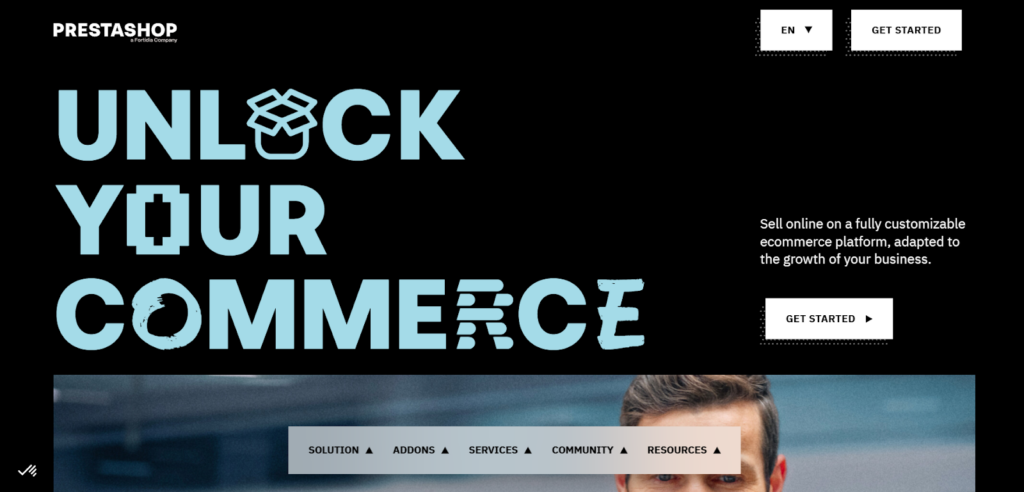
PrestaShop is an open-source eCommerce platform used in more than 190 countries. It enables flexibility and scalability, making it ideal for enterprises that want greater control. As part of MBE Worldwide, it also has access to worldwide business services.
Shopaccino

Shopaccino is an e-commerce platform for both B2C and B2B businesses. It includes a mobile app and supports major payment and shipping providers. Features like abandoned cart emails, rewards, and currency detection are built in.
Shopware
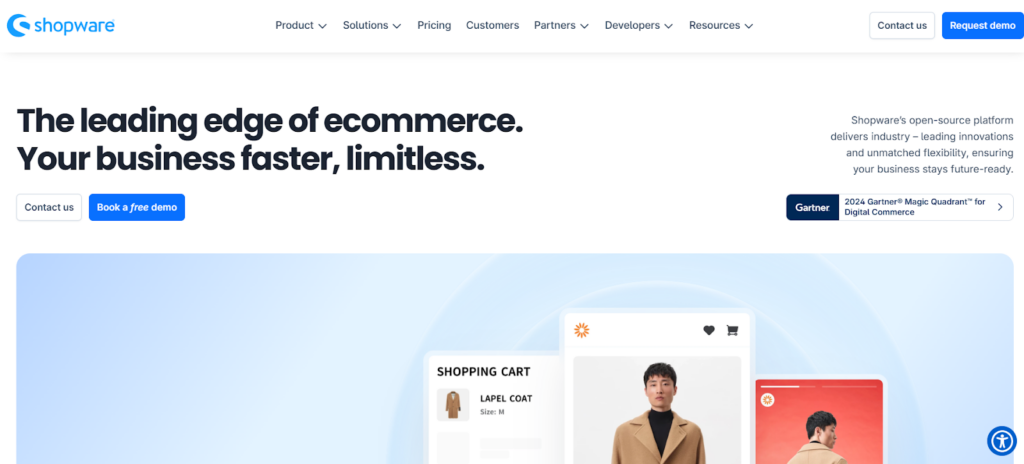
Shopware is a Germany-based commerce platform built for mid-sized and enterprise merchants. It supports B2C, D2C, and B2B models. The platform is open source, API-first, and highly customizable. It’s widely used in the DACH region and North America, with over $20 billion in annual transaction volume.
Hosted Shopping Cart Platforms
Choosing the appropriate hosted shopping cart is crucial for performance, customization, and long-term development. The following is a comparison of six prominent platforms, emphasizing both their benefits and limits.
Shopify

Shopify is a popular hosted platform for small to medium-sized businesses. It’s simple to use and doesn’t require any technical skills. However, it offers little flexibility and customization. Third-party hosting isn’t supported, and some integrations may be limited by the platform’s closed structure. It’s PCI Level 1 certified and operates on a subscription model with several pricing tiers.
BigCommerce
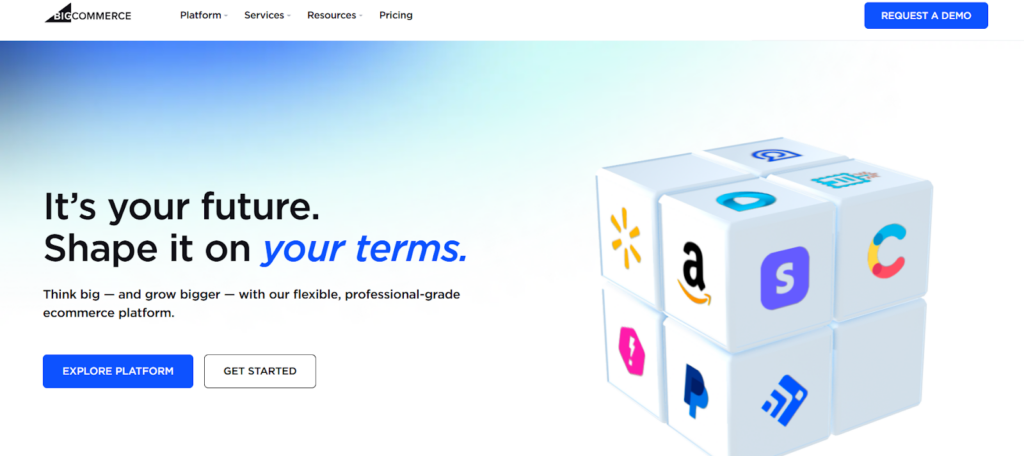
BigCommerce is suited for businesses of various sizes. It offers built-in features and an easy interface but can be limited by API rate caps and a complex pricing structure. It runs on proprietary hosting, supports PCI Level 1 security, and allows some customization. Pricing is subscription-based with different plan options.
WooCommerce
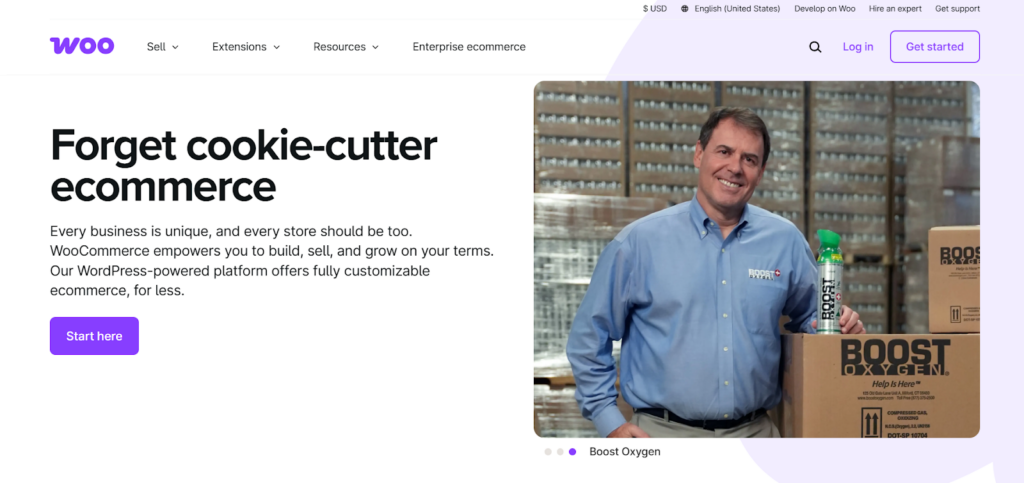
WooCommerce is a free plugin for WordPress, best for small stores. It’s self-hosted, so you manage hosting and security. It’s not PCI certified by default and relies on plugins for added features. Customization depends on WordPress, and scaling can be difficult. The core is free, but many features require expensive add-ons.
Volusion
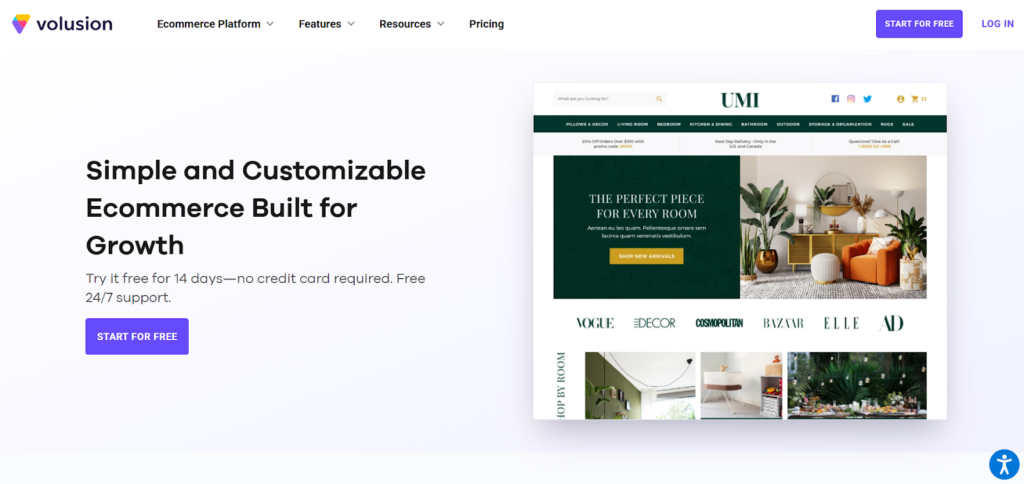
Volusion provides a hosted eCommerce platform for small and medium-sized businesses. It offers basic sales tools and is PCI Level 1 certified. Customization is restricted, and platform changes are few. Integrations are available but may be restricted. Pricing is graded according to features and use.
Magento (Adobe Commerce)
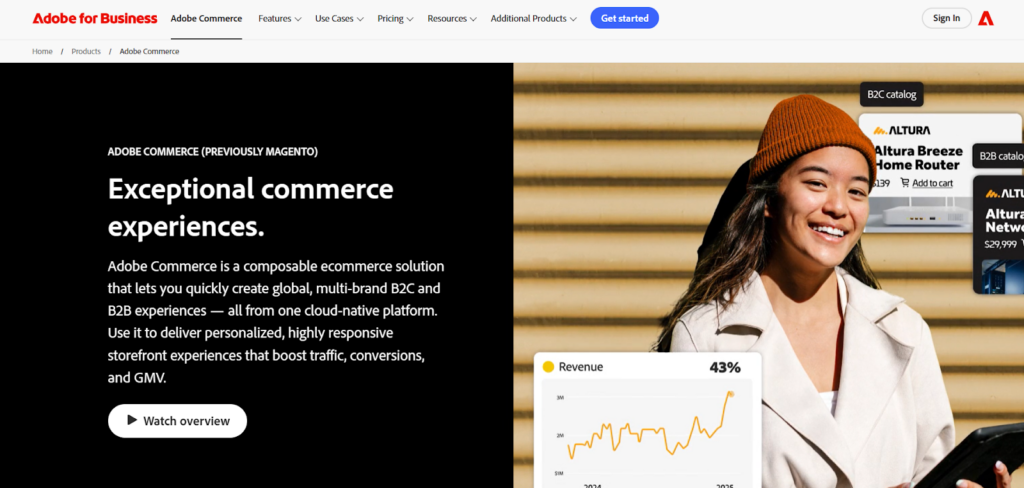
Magento is a flexible, open-source platform suited for large stores. It allows extensive customization and supports self-hosting or cloud setups. It’s PCI Level 1 certified but requires technical skills. API integrations are available but often need developer support. Pricing is custom and varies by project.
Virto Commerce
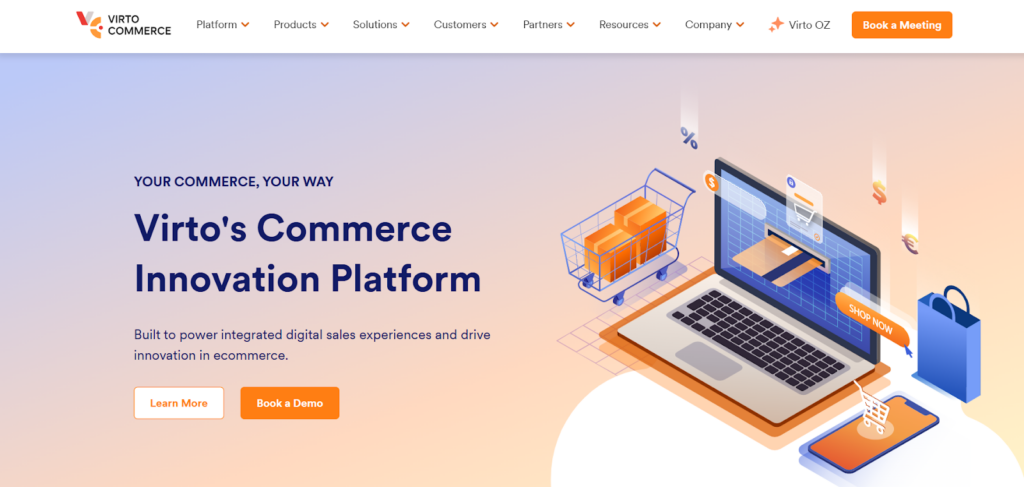
Virto Commerce is an open-source B2B platform designed for corporate use. It supports both self-hosting and cloud installations and is SOC 2 certified. The platform allows for extensive customization and easy integration with third-party systems. Pricing is customized and based on usage.
How to Select the Right E-commerce Shopping Cart
Choosing the finest shopping cart for your online store requires considering a number of crucial factors that influence cost, customer happiness, and performance.
Pricing
Although cost is important, the least expensive solution isn’t necessarily the best. Self-hosted carts may have lower upfront costs but can lack features and require technical support. Factor in not just monthly fees but also:
- Payment processing charges;
- Minimum transaction requirements;
- Integration costs;
- Cancellation or transfer fees.
Integrations
Ensure the cart integrates well with your current systems—e-commerce platform, CRM, marketing tools, and payment gateways. As your business grows, your tools should scale with it.
Supported Payment Methods
Look for carts that offer multiple payment options, such as:
- Credit/debit cards;
- Digital wallets (Apple Pay, Google Pay);
- PayPal;
- Buy now, pay later options.
Offering a wide range of payment choices can improve conversion rates and increase order values.
Customization
Your cart should match your brand and deliver a smooth checkout process. Design flexibility and efficient user flow, like one-click checkout, can help reduce friction and recover lost sales.
Shipping Options
Transparent and customizable shipping options are essential. Unexpected costs at checkout are a common reason for cart abandonment. Let users select their preferred method and clearly display total order costs.
User Experience
The cart should be intuitive and easy to use. Look for:
- Simple product edits;
- Clear cost breakdowns;
- Secure, fast checkout;
- Easy access between the cart and the store.
These elements contribute to a pleasurable buying experience, which encourages repeat purchases.
Analytics
Understanding user behavior aids in checkout process optimization. For instance, a high cart abandonment rate might indicate unclear instructions or unstated expenses. You can create data-driven enhancements by using a decent shopping cart to track performance.
Conclusion
Choosing the right e-commerce shopping cart is an important step in building a successful online business. Each solution, whether hosted, free, or premium, has distinct features, technical specs, and financial repercussions. Knowing the distinctions between platforms allows you to choose a solution that best fits your company’s goals, size, and resources. Aligning the platform with your store’s needs is critical for smooth operation and increased sales results, whether you desire total control, a fast setup, or scalability.
Posted in blog, E-commerce
Alex Carter
Alex Carter is a cybersecurity enthusiast and tech writer with a passion for online privacy, website performance, and digital security. With years of experience in web monitoring and threat prevention, Alex simplifies complex topics to help businesses and developers safeguard their online presence. When not exploring the latest in cybersecurity, Alex enjoys testing new tech tools and sharing insights on best practices for a secure web.
Web & Cloud
Monitoring
